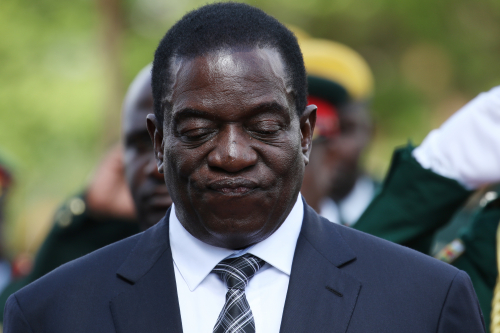
By Pearl Matibe in washington
GOVERNMENT yesterday denied that security forces were involved in the killing and torturing of civilians during last year’s January fuel price hike protests that claimed 17, leaving hundreds nursing gunshot wounds. Permanent secretary in the Ministry of Information Ndavaningi Mangwana, made the claims yesterday while reacting angrily to a decision taken by the United States of America to extend sanctions imposed on the country citing intensified human rights abuses under President Emmerson Mnangagwa.
US President Donald Trump on Wednesday extended targeted sanctions imposed on some Zanu PF officials accusing Mnangagwa of failing to utilise the window of opportunity presented by former President Robert Mugabe’s exit by his continued abuse of human rights.
In a statement, the Trump administration said it had extended the sanctions beyond March 2020, accusing Mnangagwa of not only mismanaging the economy, but escalating a crackdown on dissenting voices using State-sponsored terror.
“In accordance with this provision, I have sent to the Federal Register for publication … the notice stating that the national emergency declared in Executive Order 13288 of March 6, 2003, with respect to the actions and policies of certain members of the Government of Zimbabwe and other persons to undermine Zimbabwe’s democratic processes or institutions is to continue in effect beyond March 6, 2020,” the statement read in part.
“In the wake of the resignation of former President Robert Mugabe in November 2017, Zimbabwe’s national elections in July 2018, and President Mugabe’s subsequent death in September 2019, Zimbabwe has had ample opportunity to implement reforms that could set the country on a constructive path, stabilise the southern African region, and open the door to greater cooperation with the United States.”
The statement added: “Unfortunately, President Emmerson Mnangagwa’s administration has yet to signal credible political will to implement such reforms. Indeed, the Zimbabwean government has arguably accelerated its persecution of critics and economic mismanagement in the past year, during which security forces have conducted extrajudicial killings, rapes, and alleged abductions of numerous dissidents.”
But Mangwana blasted the US saying: “We don’t seek to interfere with the foreign policy or interests of any nation and we have a history of doing that. Our commitment is to the development of our country and the delivery of socio economic outcomes to our people.
- Chamisa under fire over US$120K donation
- Mavhunga puts DeMbare into Chibuku quarterfinals
- Pension funds bet on Cabora Bassa oilfields
- Councils defy govt fire tender directive
Keep Reading
“The government of Zimbabwe strongly objects to the unfounded assertions that its security forces engaged in acts of extra-judicial killings and rape against its own citizens in the last year. Any acts of criminality by anyone are subjected to the criminals’ processes of the country.”
He added: “We have embarked on a pathway to reform because it is in the best interests of our nation to do so and it is also necessary to align our policies and programmes with the Constitution. We, therefore, call upon those nationals who wish our country and people well to partner us and be patient with us as we continue to undertake these reforms towards meeting the aspiration of our people.”
Mnangagwa took over from Mugabe via a military coup, and promised to implement a raft of economic and political reforms, claiming his leadership was a total departure from Mugabe’s oppressive rule.
The reforms were a panacea to ending the country’s decades-old pariah status triggered by Mugabe’s violent and chaotic 2000 land reform. Re-engagement with the West was Mnangagwa’s international relations priority.
Things fell apart in August 2018 when Mnangagwa deployed the military to quell post-electoral protests. The crackdown claimed seven lives and Mnangagwa is still to implement a report by the Motlanthe Commission of Inquiry into the extra-judicial killings.
The August 2018 killings forced Washington to add State Security minister, Owen Ncube, and former army general Anselem Sanyatwe on the sanctions list over “gross violations of human rights.”
In January 2019, about 17 people were further killed when Mnangagwa again deployed soldiers to thwart fuel price hike protests. Several people were left nursing gunshot wounds and videos went viral on social media of soldiers torturing civilians in the aftermath of the protests.
Mangwana, without disclosing who killed the civilians, exonerated the security forces, claiming all suspected cases would be dealt with in line with the laws of the country.
However, soldiers and police officers who appeared in videos assaulting people have not been brought to book, while Mnangagwa has continuously promised the international community to implement the Motlanthe Commission report that implicated soldiers.
The extension of the restrictive measures were despite a spirited attempt by Mnangagwa to rope in Sadc and the African Union to pressure the US administration to scrap the embargoes used by the Zanu PF leader as a scapegoat for the deteriorating economic situation in the country.
The Zanu PF leader has also hired four public relations consultancy companies to lobby Washington on the political front for the removal of the sanctions, costing the cash-strapped country millions of dollars.
The economically-troubled country has signed a US$1,5 million deal with some American-based image management consultancies to lobby for the removal of the sanctions, including Brian Ballard, that was involved in the fundraising of Trump’s 2016 presidential election.
The targeted sanctions apply to 86 Zimbabwean individuals, mostly Zanu PF and military chefs, and 56 entities (mostly farms and legal entities owned by the 87 individuals) as of February 2020.
The sanctions regime was first implemented by the Office of Foreign Assets Control (“OFAC”) on March 7, 2003, when the US was still under George Bush when an executive order imposed the restrictions on specifically identified persons undermining democratic institutions or processes in Zimbabwe.”
Since then, former US President Barack Obama and Trump have extended the embargoes. — Additional reporting by Everson Mushava











